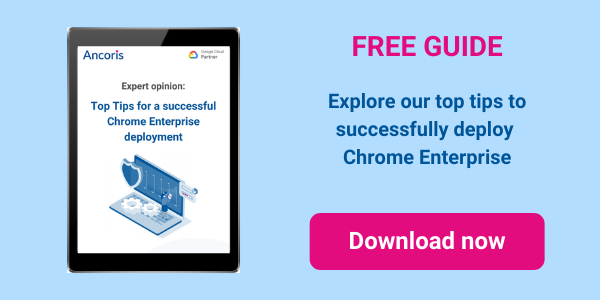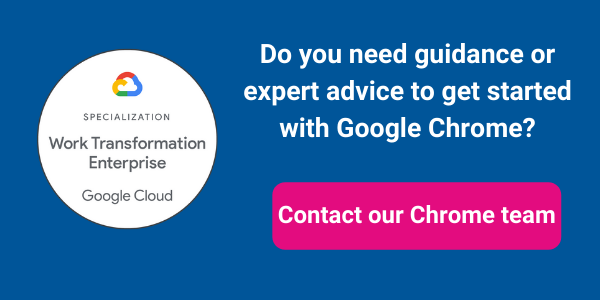At the end of 2020, we co-hosted an online roundtable during which representative from three non-profit organisations talked about why Chrome devices are a key component in their IT strategies. 
The participants were:
- Gordon May, Global Head of IT at Tearfund, a faith-based international NGO that’s “passionate about ending poverty”
- Stuart Pearson, Chief Digital Officer at Citizens Advice Manchester, which offers free independent confidential advice on issues such as debt and housing
- Alan Moynihan, Head of IT Customer Solutions at the Royal Society for the Prevention of Cruelty to Animals (RSPCA), the UK’s largest animal welfare charity
Here are the top 5 benefits that the three contributors have seen after moving from Windows machines to Chrome OS devices:
1. Quick to provision
You simply add licences to your domain, enrol the Chromebooks and give them to users. This kind of provisioning let Moynihan roll out 500 Chromebooks to the RSPCA’s uniformed inspectorate in a matter of weeks, something he believes would have taken months to achieve with Windows laptops. In fact, research by Google suggests it takes an average of just over 30 minutes to prepare each Chrome OS device for deployment, compared with more than two hours for a Windows machine.
2. Require less support
Updates to the Chrome OS are downloaded and installed automatically and seamlessly in the background and are available immediately the next time users reboot. There’s no need for users to wait while updates are applied or bring their device into the IT department. If there’s a technical issue with a device, Chrome remote desktop helps you fix it without needing to get hands on. In the case of a hardware failure, you can simply ship the user a brand new device and set it up remotely for them.
In fact, research from Google suggests, IT teams will need to handle 5 times as many support requests if their organisation runs Windows on the desktop than if it runs Chrome OS. As May points out, “That lets the IT team really focus on adding value, instead of spending time on setup, security or fixing things.”
3. Easy to secure
Chromebooks are designed to be very hard to compromise. A verified boot process checks every time you boot up that the operating system looks right — and defaults to a backup copy of the OS if something is off. Installed apps and extensions simply can’t modify the OS and are strictly sandboxed to limit the extent of any attack.
“The thing that keeps us up awake at night is security,” says Pearson. “But a Chromebook is sandboxed, encrypted from the get-go, and supports two-factor authentication. Behind that, you've got mobile device admin as well, so you can look at where devices are and block them if you need to. It was so reassuring to be able to give people Chromebooks and know from a security point of view that we're in safe hands.”
4. Let users work from anywhere
With apps that run in a browser and data stored in the cloud, all you need is an internet connection. In fact, you don’t even need that: Chromebooks come with everything you need to work offline, including on-device storage and an an ecosystem of Android apps that will almost all work offline. When the country went into lockdown last year in response to the Covid-19 pandemic, Moynihan says staff with Chromebooks just went home and carried on with their work as if they were still in the office.
5. Great for public access applications
Chrome devices come in a range of form factors, including Meet hardware that lets people connect simply by touching a keypad, enabling even digitally disadvantaged clients access services. Citizens Advice Manchester, for example, was able to continue to provide face-to-face advice at partner venues during lockdown by using Meet hardware to set up video chats between clients and advisors working from home.
Pearson says clients and advisors were happy with the service, while partner venues loved the solution because they didn’t have to provide any technical support. Chrome devices can also be set up to wipe everything users have done once they’ve finished with a device, making them ideal for providing shared devices where you need to be sure next person who comes along can't see information or documents from previous users.
Chrome is not just for Google Workspace users
While Tearfund, Citizens Advice Manchester and the RSPCA have moved to Chrome devices as part of a wider strategy of moving to cloud apps like Google Workspace, you don’t have to wait until you’ve moved all your applications to the cloud before you deploy Chrome. Chrome supports Citrix Workspace and other virtual desktops, so staff working from home can continue to access applications running on your own servers. The RSPCA’s IT team, for example, has continued to use its on-premise helpdesk system after switching to Chromebooks.
Top tip: Don't underestimate cultural change
The main challenge of switching to Chrome OS, all three organisations agree, is that it’s a big cultural change for users who have only ever used Windows machines. It’s therefore essential to put in place a change management programme to help users become confident and productive with their new devices as quickly as possible. “There are obviously no technical issues why they can't use Chrome OS,” Pearson points out when speaking of staff who were reluctant to make the switch. “It was just they were very wedded to to Windows. But what has been proved over the last six months [of lockdown] is that when those people who were still the holdouts for Windows were given a Chromebook and sent away — they now love it.”
If you want to find out more about how Google Cloud and Chrome devices can help your non-profit, you can watch the full roundtable on Google Cloud’s YouTube channel or read about Citizens Advice Manchester’s experience with Meet Hardware.
Or come and talk to the experts in our Chrome team, who’ve been helping non-profits like yours change IT from being a barrier to an enabler with Chrome devices.

